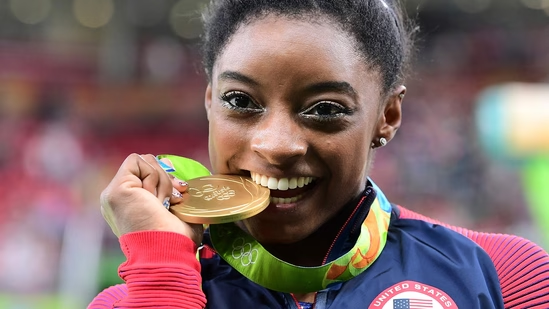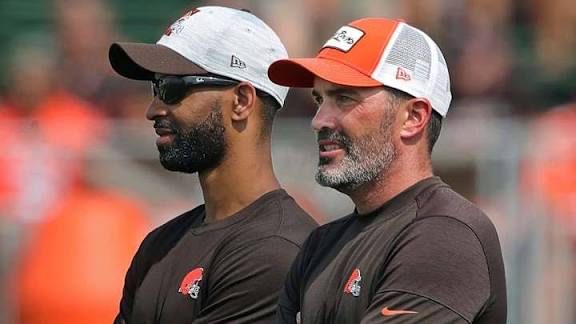Simone Biles will be heading to Paris to stage her Olympic comeback after pulling out of multiple events in Tokyo due to twisties, which is a temporary loss of spatial awareness. In her comeback, she booked her third straight Olympic appearance, with an all-round win at the US trials.US gymnast Simone Biles celebrates with her gold medal after the women’s individual all-around final of the Artistic Gymnastics at the Olympic Arena during the Rio 2016 Olympic Games.(AFP)Born in Ohio on March 14, 1997, Biles entered the world of gymnastics at only six years old and since then was destined for greatness. At only 16, she bagged two golds at the Antwerp Championship, including the all-round title. She also showed the world her groundbreaking move on the floor exercise for the first time, a double layout with a half twist.Also Read | “Each took 20 hrs to make”: The inside scoop on Mongolia’s viral 2024 Paris Olympics uniformExplore Crickit, your go-to platform to catch the game, anytime, anywhere. Click here!She got four gold medals at the Worlds in 2014, and then another four in 2015. At her first Olympics in Rio in 2016, she got gold in the all-around, team, vault and floor exercises, and bronze on the balance beam.In 2023, she took her tally of world and Olympic medals to 37. She now has six world all-around titles and will be the one to watch out for in Paris. In Paris, she will be the oldest woman gymnast to participate for the US since Marie Hoesly in 1952.What did her coach say?Her coach Cecile Landi said, “I think we always knew she could be better. She’s the most talented athlete I’ve ever worked with and so we just knew if she could get her mental game as well as her physical game, then she would be close to unstoppable.”What did Simone Biles say?Responding to her critics who have pointed out her Tokyo Olympics phase, after winning the Olympic trials she said, “They’ll still say like, ‘Oh my gosh, you’re going to quit again? Or are you going to quit again?’ And like, and ‘If I did, what are you going to do about it? Tweet me some more? Like I’ve already dealt with it for three years. But yeah, they want to see us fail.”Furthermore, she added, “They want to see the downfall, which is really unfortunate because sports hasn’t seen athletes like we’ve seen before. So you really have to give them their flowers in the sport because once they’re gone, you’re going to miss them.”Speaking on her performance at the Olympic trials, she said, “Nobody’s forcing me to do it. I wake up every day and choose to grind in the gym and come out here and perform for myself. Just to remind myself that I can still do it.”For the first time, a psychiatrist and sports psychologist will accompany the country’s athletes at the OlympicsBengaluru: Divya Jain spent a good part of the pandemic staring into tiny panels of anxious athletes on her Zoom screen. The Tokyo Olympics had been postponed, training centres were shut, Covid-19 protocols were in place and the Olympic athletes she chatted with were having trouble sleeping and staying motivated. Their structured training routines were gone in a poof and the uncertainty was debilitating for many.The athletics contingent, one of the biggest Indian groups at the Olympics, will hope to benefit from the mental health professionals travelling with the squad to the Games. (SAI)Another Olympics is upon us and this time, Divya, a sports psychologist, along with her senior colleague and psychiatrist, Dr Samir Parikh, are headed to Paris as part of the Indian Olympic Association’s medical team. This sort of focus on mental health is not something Parikh, who has decades in the profession, would’ve anticipated even five years ago.Explore Crickit, your go-to platform to catch the game, anytime, anywhere. Click here!“The conventional idea of athletes needing mental support was largely to do with getting into a zone and reaching an optimal performance state,” said Parikh, Chairperson, Fortis National Mental Health Program. “But now, we seem to understand that the mental wellness of an athlete is extremely important too. I wouldn’t have imagined that there would come a day when two mental health professionals would be included in India’s Olympic medical team. It’s a huge step.”If the pandemic got the conversation started, the Tokyo Olympics intensified the global discourse on the importance of mental health. Simone Biles and the ‘twisties’ were at the heart of it. The preternaturally talented Olympic champion gymnast pulled out of multiple events in Tokyo, citing that she had the ‘twisties’ – a temporary loss of spatial awareness. According to data analytics company NewsWhip, Biles’ shocking withdrawal generated two million social media interactions and sparked a conversation on mental health, much higher than either Naomi Osaka’s French Open withdrawal or Prince Harry and Meghan Markle’s interview with Oprah. Google searches about mental health reportedly spiked on the day of Biles’ withdrawal, touching its highest in two months.Aside from the stigma of seeking help with mental health issues, athletes face an additional hurdle. “There is a public perception of athletes being strong, unbreakable characters. Athletes can worry about being perceived as weak if they express emotions or mental struggle,” says Divya, Head, Psychological Services for the Fortis National Mental Health Program. Virat Kohli once spoke of going through a phase in his career where he felt like “it was the end of the world”. “In England 2014, I just didn’t know what to do, what to say to anyone, how to speak, how to communicate. To be honest, I couldn’t have said I am not feeling great mentally and I want to get away from the game, because you never know how that’s taken.”For India’s Paris-bound athletes, the mental health support by both experts won’t just be limited to the duration of the Games. “We will be available to assist athletes both before as well as after the Games too,” said Parikh. “The impact of the competition does, after all, tend to go on for longer. We’ll of course be looking at both the performance enhancement aspect – how players are dealing with the pressures and expectations that come with the occasion – while also ensuring mental well-being and managing stress from extraneous factors.”Parikh and Divya, along with the rest of the IOA medical team, have been introduced to the Paris-bound athletes. “I travelled to SAI centers and NIS Patiala since it’s important that athletes know us by name and face so they aren’t sitting down with someone they’ve never met before, in Paris. There’s going to be a medical room where we’ll be available and if the need arises we’ll travel to the venues,” said Divya.“At a stage like the Olympics, it’s likely that many of the concerns could be performance or anxiety related. Whether it’s a first-timer or someone returning from injury. We use visualisation both for mental rehearsal of technique and for athletes to plan for contingencies. Mindfulness-based training is helpful for regulating our emotions so that they don’t derail us in high pressure moments. Also, bringing your focus back to the present, rather than fixating on the previous point, ensures you maintain an external locus when necessary and remain flexible. In high-pressure environments, athletes can have a tendency to try too hard, which is when things start to go wrong.”Unlike their regular consultations, the window between an athlete seeking help and a workable solution is rather short in a live sporting event. Parikh sees it as an opportunity. “Rather than thinking we don’t have time to fix this, we look at it as something where instead of days, the solution just needs to be applied for minutes or over a few games.”The International Olympic Committee (IOC) first came up with a mental health toolkit ahead of the Tokyo Games. This time, the body has provisioned for athletes to have access to a mindfulness app and a dedicated mental health helpline – operating 24/7 and covering 70 languages.


